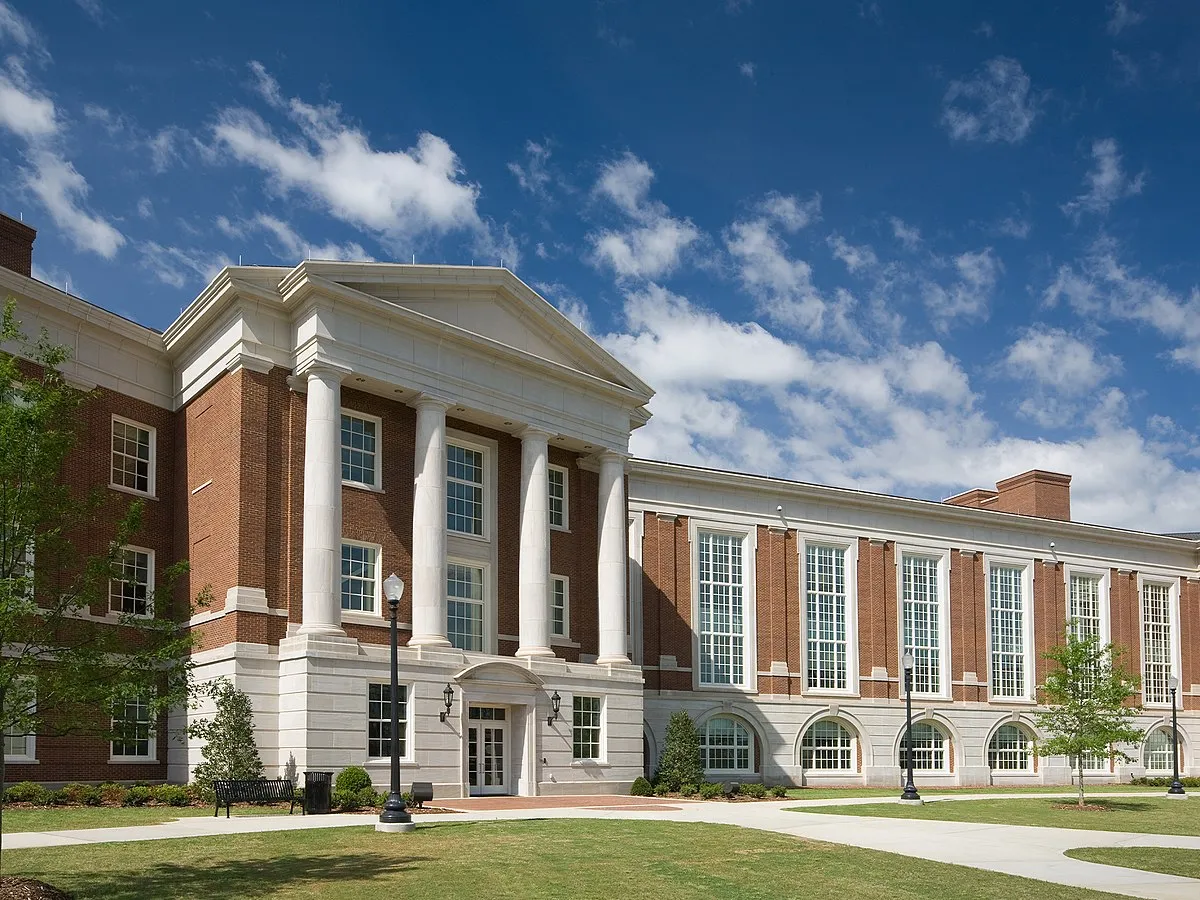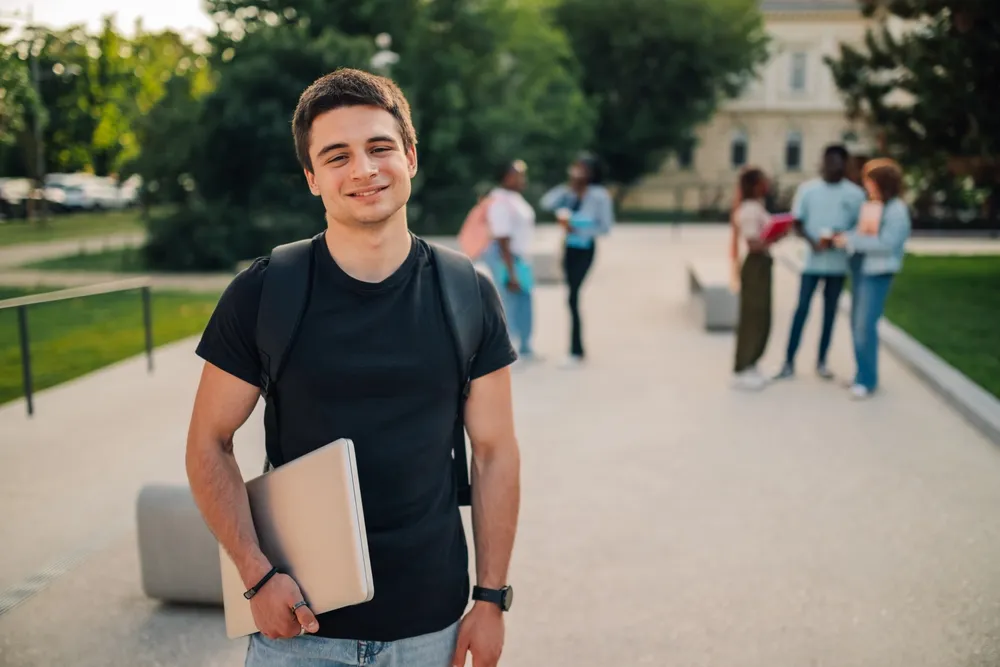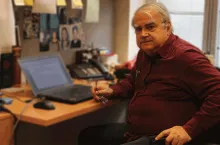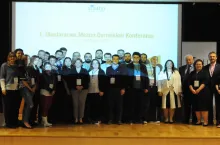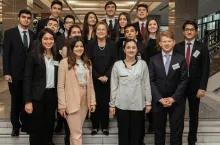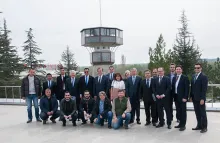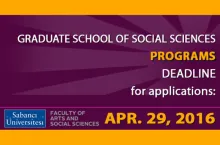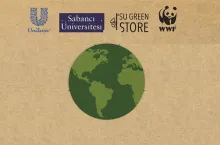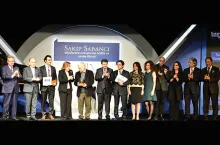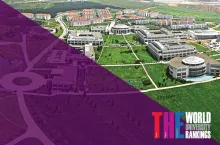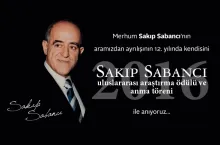Sakıp Sabancı Remembered with the “Sakıp Sabancı International Research Awards” in the 12th Year of His Passing
2016 Sakıp Sabancı International Research Awards given for “New Centers in Turkey: Economy, Education, Art and Peace in Cities"
Sabancı University Founding Board of Trustees Chair Güler Sabancı: "If there is technology and talent in a tolerant environment where different ideas and opinions are respected, creativity may emerge."

This year's Jury Prize in the Sakıp Sabancı International Research Awards was given to Middle East Technical University Faculty Member İlhan Tekeli. The two equally-weighted Essay Awards were given to Azat Zana Gündoğan from Cornell University and Emrah Şahin from the University of Florida.
In honor of the late Sakıp Sabancı, Honorary Chairman of the Board of Trustees of Sabancı University, the “Sakıp Sabancı International Research Awards” were presented at a ceremony hosted by the Sakıp Sabancı Family, Founding Board of Trustees Chair Güler Sabancı, and President A. Nihat Berker on Monday, April 11, 2016 at the Sabancı Center.
The subject for this year's awards was “New Centers in Turkey: Economy, Education, Art and Peace in Cities".
Introductory remarks to the ceremony were delivered by Sabancı University Founding Board of Trustees Chair Güler Sabancı. Sabancı University Faculty of Arts and Social Sciences member Ayşe Parla, the president of this year's jury panel, explained the reasoning behind the jury's selection.

The Special Jury Prize was given to İlhan Tekeli from the Middle East Technical University. Tekeli was given the Special Jury Prize for his work on urban and regional planning, planning theory, macro-geography, migration geography and political behavior, history and theory of local administrations in Turkey, urbanization and urban policy, economic policy, the economic history of Turkey, and urban and community studies.
The two equally-weighted Essay Awards were given to:
Azat Zana Gündoğan from Cornell University with “Rethinking the Notion of New Centers"
Emrah Şahin from the University of Florida with "Dogs and Caravan"
İlhan Tekeli received his prize from Governor of Istanbul Vasip Şahin, Sabancı University Founding Board of Trustees Chair Güler Sabancı and Sabancı University President Professor A. Nihat Berker. Essay Award winners received their prizes from Mayor of Istanbul Dr. Kadir Topbaş, Sabancı University Board of Trustees Member Sevil Sabancı, and Sabancı University President Professor A. Nihat Berker.
“Sakıp Sabancı was a firm believer that a better future for Turkey lay in a well-educated and well-trained youth"
Introductory remarks to the ceremony were delivered by Sabancı University Founding Board of Trustees Chair Güler Sabancı. Sabancı University Founding Board of Trustees Chair Güler Sabancı began by talking about the late Sakıp Sabancı's personality. Güler Sabancı said, “Whether or not you personally knew Sakıp Sabancı, the first thing that comes to mind about him is his genuine, candid, positive, constructive and worldly personality that endeared him to the Turkish people." Güler Sabancı emphasized Sakıp Sabancı’s love for his country and his firm belief that Turkey was always going to make progress, achieve a brighter future, and that a better future for Turkey lay in a well-educated and well-trained youth.
"He gave the courage to do something different"
Güler Sabancı said that Sakıp Sabancı had always been in full and unwavering support of education knowing its importance in Turkey's development and advancement, continuing, "He gave us direction to build an exemplary institution that would provide the best in education. We followed his dream to build a global university. Our search conference and design committees came up with a university that was unique and different, which would in turn make a difference in Turkish higher education." Saying that Sakıp Sabancı stood by them in their journey towards making Sabancı University a reality, Güler Sabancı continued, “He gave us the courage to do something different. That is what brought Sabancı University to the present day. We are delighted that our university both made a difference in Turkish higher education, and gained important ground towards becoming a global university. Some of our graduates as young as 20 are now pursuing doctorate levels in world-class universities."
“Sabancı University raises bright young adults who are devoted to universal values, accept the leadership of science, and are open to the world."
Speaking of Sabancı University's achievements, Güler Sabancı pointed out that graduates were now advancing to directorship positions in multinational companies. Sabancı also mentioned entrepreneurial graduates who embraced the example set by Sakıp Sabancı to think outside boundaries and contributed to the national and global economy.
Güler Sabancı said that the university topped the entrepreneurship and innovation rankings prepared by Ministry of Science, Industry and Technology for four years, adding that Sabancı University was also recognized by international rankings. Güler Sabancı mentioned the position of Sabancı University on some of these lists.
Sabancı added that Sabancı University raised bright young adults who were devoted to universal values, accepted the leadership of science, and were open to the world.
"There can be no creativity without technology, talent and tolerance"
Explaining that Sakıp Sabancı was an immensely tolerant person, Güler Sabancı mentioned the side of him that admired and encouraged creativity. Güler Sabancı argued that tolerance removed boundaries to human capabilities and vision when success was at stake. Güler Sabancı continued, “While Sabancı University walks on the path to become a global university, a recent worldwide study suggests that creativity depends on three Ts: Technology, Talent and Tolerance. This is our belief as well. Sabancı University's position on international rankings and the Ministry index shows that the 3T's are getting along quite well here.
If there is technology and talent in a tolerant environment where different ideas and opinions are respected, creativity may emerge."
Güler Sabancı said that Sakıp Sabancı had an excellent grasp of interdisciplinary studies, which was why he was equally supportive of medical, natural and social sciences at once, believing that they would go the furthest if they ran abreast. She said that it was this vision which made Sakıp Sabancı put something in his will that was a first for Turkey.
Güler Sabancı also told the story of how the Award became a part of Sakıp Sabancı’s will: “We were together with our Founding President, the late Tosun Terzioğlu, when Sakıp Bey was writing his will. Sakıp Bey asked Tosun Bey: 'This award I am going to write in my will - which subject should it be on?' Although Tosun Bey was a mathematician, he said that the award should be in social sciences, and explained his reasoning. 'Whatever you say, professor' was Sakıp Bey's reply. Then, Tosun Bey and Hüsnü Bey wrote that section of the will together. We are here today as a result of that discussion."

“Sakıp Sabancı International Research Awards is a first for Turkey and sheds light on Turkish studies in social sciences.”
Güler Sabancı said that the Sakıp Sabancı International Research Awards focused on a variety of subjects from Turkish economy to foreign policy, history and social dynamics, continuing, “Sakıp Sabancı International Research Awards is a first for Turkey and sheds light on Turkish studies in social sciences including sociology, economics, history and political science."
Güler Sabancı briefly mentioned the subjects of previous Awards and said that it took a full year's work to prepare for every edition of the Awards. Sabancı explained that the process was handled by the Sabancı University Faculty of Arts and Social Sciences and the Istanbul Policy Center in partnership, and that the submissions were assessed by an international jury panel. Güler Sabancı revealed the subject for the 2017 Awards to be “Europeans of Turkish Origin in Everyday Life.”
Güler Sabancı also said that they would support young social scientists working on significant and relevant issues for Turkey.
"Urbanization is the greatest transformation that a society can experience"
Special Jury Prize winner İlhan Tekeli began his speech by expressing his delight in winning an award given in honor of Sakıp Sabancı.
Tekeli said that his own life had a lot in common with the urbanization of Turkey, continuing, "The Turkish experience has been parallel with mine both as a citizen and an urban planner." Tekeli explained that as an urban planner, his job was to experience, observe, study and develop strategies.
Tekeli said that urbanization was the greatest transformation that a society could experience, and that Turkey underwent this entire process within a single generation's lifetime, which had never been seen in any other nation.
İlhan Tekeli then explained that pace was not the only differentiating factor of transformation in Turkey and pointed out the fact that urbanization in Turkey was concurrent with the multiparty regime, emphasizing that it was a difficult feat to achieve in a country with little capital.
Tekeli said that while urbanization was essentially a difficult process, the large picture became clearer when the dust settled and the end result was viewed from afar, which also revealed success stories. Tekeli argued that the transformation in Turkey was free of large-scale clashes contrary to the process in other countries.

"From the 1980s onwards, cities became self-organizing systems"
İlhan Tekeli said that cities and his own profession experienced great changes over his 70-year lifetime. According to Tekeli, there used to be distinct lines separating urban and rural areas, as a result of which urban growth reached its natural limits in the 1980s. This led to a new way of urbanization in the form of housing projects. İlhan Tekeli continued, "Great resources were mobilized for urbanization. Previously, urban growth occurred by adding new buildings and resembled an oil spill, while the new mode of growth consisted of new additions to the peripheries of the old cities. City centers became multi-focal; the city transformed the country, and the line between city and country became blurred."
Pointing out the change in planning activity, İlhan Tekeli said, "As external influences shaped the city, urban plans today are anonymous. From the 1980s onwards, cities became self-organizing systems. Examples of participatory planning began to emerge. The idea of administration was replaced by governance. We began to realize the importance of implementing a culture of democracy. We must first think of democracy, and then a new city parallel to that idea."
Almost 350 submissions from 31 countries over 11 years
Sakıp Sabancı International Research Awards were established 11 years ago to honor the will of the late Sakıp Sabancı, and are given by Sabancı University in fields including Turkish and Islamic art, and the history, economy and sociology of Turkey. The award program is led by the Sabancı University Faculty of Arts and Social Sciences and the Istanbul Policy Center. Submissions are reviewed by an international panel of independent jury members. In the last 11 years, Sakıp Sabancı International Research Awards have been given in subjects ranging from Turkey's economy to foreign policy, history, and social dynamics. Almost 350 submissions were received from 31 countries for the 11 Awards given so far.
Starting in 2015, the Board of Trustees and Sakıp Sabancı Family resolved to give the Sakıp Sabancı International Research Awards as part of the Remembrance Ceremony. Award themes in previous years were other pressing issues such as “Checks and Balances in Democracy: the Turkish Case from a Comparative Perspective,” “Gender Equality in Turkey” and "Coexisting in Turkey: Diversity, Dialog and Cooperation." The 2016 awards were given in "New Centers in Turkey: Economy, Education, Art and Peace in Cities".
The subject for the 2017 Awards was revealed to be “Europeans of Turkish Origin in Everyday Life”. In the tradition of the previous awards, the 2017 Sakıp Sabancı International Research Awards will seek to support scholars, particularly young social scientists, discussing a current issue on an academic level.
Jury Panel
The president of this year's Jury Panel was Sabancı University Faculty of Arts and Social Sciences member Ayşe Parla. Other members were Ardahan University President Ramazan Korkmaz, Harvard University Faculty Member Neil Brenner, Open University Faculty Member Engin Işın, Sabancı University Faculty of Arts and Social Sciences Dean Ayşe Kadıoğlu and Sabancı University Istanbul Policy Center Director Fuat Keyman.
Depending on the subject of the awards, up to six internationally-recognized scholars are chosen by the President, the Sabancı University Faculty of Arts and Social Sciences Dean and the Istanbul Policy Center Director to be invited as jury panel members. The President of the Jury Panel is chosen among its members.
FASS Dean and IPC Director are also members of the jury panel. Jury members may be disclosed to the media after the awardees are chosen and notified. Members are kept confidential from the public and the applicants prior to selection.
About İlhan Tekeli
Urban planner and sociologist İlhan Tekeli was born in Izmir on November 6, 1937. After his primary and secondary education in Izmir, he graduated from the Civil Engineering Department of Istanbul Technical University. He completed his graduate studies in Urban Planning in the Middle East Technical University in 1964 and his postgraduate studies in the University of Pennsylvania in 1966.
He obtained his PhD in Urban Planning from Istanbul Technical University in 1968. He has been a professor in the Urban Planning Department of METU since 1970. Tekeli has given lectures as a visiting professor in numerous universities abroad and acted as an advisor to a number of municipalities and companies in Turkey.
In addition to being the founder and president of the History Foundation, he acted as the Chairman for 10 years. He was a founding member of the Executive Board of the World Academy for Local Government and Democracy. He was a member of the Council for Higher Education between 2004 and 2008. He has published over fifty books and four hundred articles and conference papers in various languages.
Tekeli holds a number of awards in Social Sciences. In 1989, Tekeli and Selim İlkin won the Sedat Simavi Social Sciences Award. Tekeli won the 1994 Mustafa Parlar Science Award. He was chosen to Turkish Academy of Sciences membership in 1996. He won the 1999 Mustafa Parlar Outstanding Achievement in Education Award and the 2006 TÜBİTAK Excellent Service Award.
İlhan Tekeli has published a number of books on urban and regional planning, planning theory, macro-geography, migration geography and political behavior, history and theory of local administrations in Turkey, urbanization and urban policy, economic policy, the economic history of Turkey, and urban and community studies. His scientific writings were published by the History Foundation in 25 volumes. His writings on history coauthored with Selim İlkin were published by Istanbul Bilgi University.

